According to historical sources, Allah honored Mary, who lived approximately two millennia ago, with the birth of the Prophet Jesus (pbuh). She was one of the chosen women on Earth as well as in the Hereafter. Born in Roman-occupied Palestine, she was a Jewess and lived in the Jewish community.
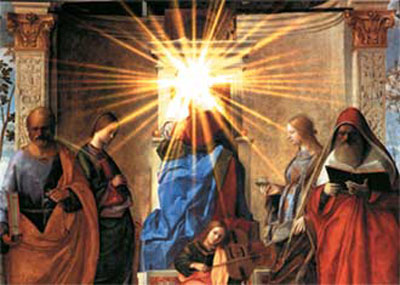
Giovanni Bellini's painting depicting Mary, 1505. It is on display in the St. Zaccaria church in Venice. This altar painting, oil on wood, measures 402 x 273 cm. It was later on transferred onto canvas.)
.... What an excellent servant! He truly turned to his Lord.
(Surah Sad, 30)
In Our eyes, they are among the best of chosen men.
(Surah Sad, 47)
Idolatry was Rome's state religion. The Jews, once a nation preferred by Allah "over all other beings" (Surat al-Baqara: 47), had altered His religion, adopted false beliefs, rebelled against Allah's commands, and were no longer grateful for His gifts to them. Some of them even martyred the Prophets sent to them by the grace of Allah, because they did not like the commands that these exalted men conveyed. The Qur'an reveals their transgressions:
We made a covenant with the tribe of Israel and sent Messengers to them. Each time a Messenger came to them with something their lower selves did not desire, they denied some and they murdered others. (Surat al-Ma'ida: 70)
Mary was born at an unsettled time, when the Jews' only hope was their expected Messiah (savior). Unknown to her, Allah had already determined to choose and raise her for this holy duty. She was central to the Israelites' expectations, for she would give birth to the Prophet Jesus (pbuh), whom He compliments in the following terms: "His name is the Messiah, Jesus, son of Mary, of high esteem in this world and the Hereafter, and one of those brought near. He will speak to people in the cradle and when fully grown, and will be one of the believers" (Surah Al 'Imran: 45-46).
Allah chose Mary to represent morality and true religion among her people, who had left the true religion and embraced superstitions and idle speculation. Allah reveals many aspects of her life, among them her birth and family, the birth of the Prophet Jesus (pbuh), her superior character, and how she resisted her society's slanders and accusations.
Allah reveals that "Allah chose Adam and Noah, and the family of Abraham and the family of 'Imran, over all other beings—descendants one of the other..." (Surah Al 'Imran: 33-34). In other words, 'Imran's family descended from the Prophets Adam (pbuh), Noah (pbuh), and Abraham (pbuh), and they were exalted people. One of these chosen people was Mary, whose family sincerely believed in Allah, respected the limits that He has established for humanity, and always sought and trusted Him.
When `Imran's wife, a sincere believer, found out that she was pregnant with Mary, she immediately prayed to Allah. She praised Him and promised that she would dedicate her child to Him. When she gave birth to a girl, she named her Mary, which means abida in Arabic, in other words Allah's worshipper. Allah reveals her prayer in the following verse:
Remember when the wife of 'Imran said: "My Lord, I have vowed to You whatever is in my womb, to be devoted [to Your service]. Please accept it from me. You are the All-Hearing, the All-Knowing." When she gave birth, she said: "My Lord! I have given birth to a girl"—and Allah knew very well what she had given birth to, male and female are not the same—"and I have named her Mary and placed her and her children in Your safekeeping from satan, the accursed." (Surah Al 'Imran: 35-36)
The Arabic word muharreren, translated here as devoted [to Your service], means "preoccupied only with the Hereafter and having no interest in the world, in the service of Allah's temple, worshipping in great devotion, one whose worship is not tainted by worldly aims."1
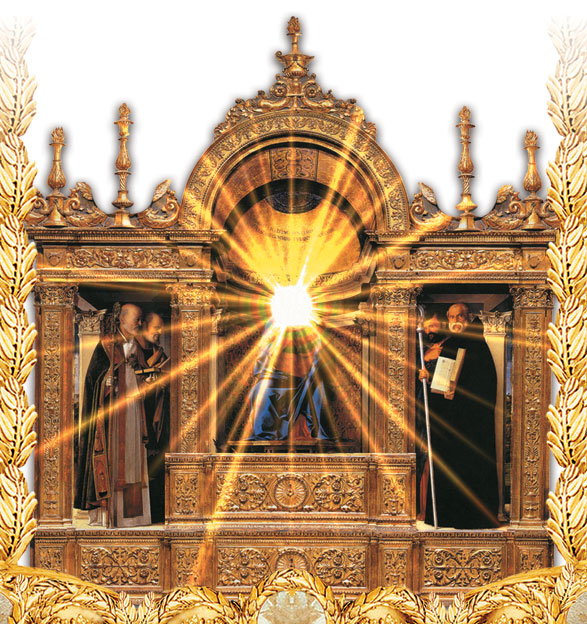
One of Giovanni Bellini's masterworks, "Frari Triptych," 1481, is displayed in the Church of Frari, Venice, Italy.
True freedom can be attained only by serving Allah, surrendering to Him, and freeing oneself from all service to any other beings or values. This is what 'Imran's wife prayed for when dedicating Mary to Allah, for she wished her daughter to be someone who served only Allah and who did not seek her people's or society's acceptance.
Right after Mary's birth, her mother turned toward Allah, sought His good pleasure, and asked Him to protect Mary, as well as her children, from satan's evil. Allah accepted this wholehearted prayer "and made her [Mary] grow in health and beauty" (Surah Al 'Imran: 37). In other words, Mary received the best upbringing and the most superior character.
Mary's mother's wholehearted faith in Allah, acceptance of only Allah as her mentor, constant turning toward Him, and her genuine surrender to Him are very important examples upon which all believers should reflect.
Their Lord responds to them:
'I will not let the deeds of any doer among you go to waste, male or female – you are both the same in that respect..."
(Surah Al 'Imran, 195)
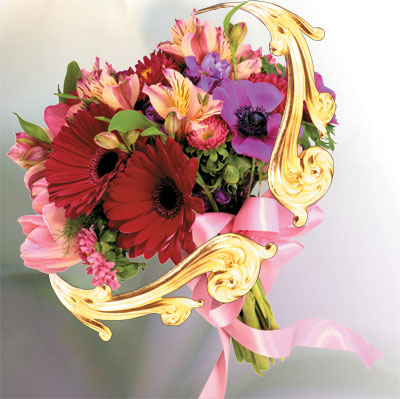
Allah gave the Prophet Zacharia (pbuh) sincere faith and exalted him, and guided him to the righteous path. Allah compliments him and tells us about his devotion, his proper fear and respect of Him, and his superior character:
And Zacharia, John, Jesus, and Elijah. All of them were among the believers. And Ishmael, Elisha, Jonah, and Lot. All of them We favored over all beings. And some of their forebears, descendants, and brothers; We chose them and guided them to a straight path. (Surat al-An'am: 85-87)
The Qur'an reveals that Allah made the Prophet Zacharia (pbuh) responsible for educating Mary. He fulfilled this trust, witnessed the many miracles in her life, and noticed that she was favored over all other people. He saw how Allah's grace supported her and met all of her needs. For example:
And Zachaaria became her guardian. Every time Zacharia visited her in the sanctuary, he found food with her. He asked: "Mary, how did you come by this?" She said: "It is from Allah. Allah provides for whoever He wills without any reckoning." (Surah Al 'Imran: 37)
Mary's answer to his question testifies to Allah's grace and providence.
Any blessing you have is from Allah. Then when harm touches you, you cry to Him for help.
(Surat an-Nahl, 53)
Mary was a most devout Muslim who genuinely dedicated herself to our Lord, praised His name, and turned toward Him in prayer constantly throughout her life. Just as Allah chose 'Imran's family above all others, He chose Mary and ensured that she would be educated in the best manner, purified from all wickedness, and preferred above all other women. Allah relates her superiority:
And when the angels said: "Mary, Allah has chosen you and purified you. He has chosen you over all other women. Mary, obey your Lord and prostrate and bow with those who bow." (Surah Al 'Imran: 42-43)
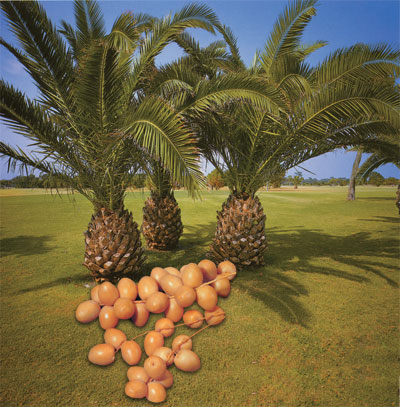
Mary, like the rest of her family, was known among her people for her devotion to Allah as well as her religiosity, chastity, and sincerity. Allah speaks of her as someone obedient to Him.
And Mary, the daughter of 'Imran, who guarded her chastity—We breathed Our Spirit into her. She confirmed the Words of her Lord and His Book, and was one of the obedient. (Surat at-Tahrim: 12)
… and she who guarded her chastity. We breathed into her some of Our Spirit and made her and her son a Sign for all the worlds. (Surat al-Anbiya': 91)
Mary experienced many miracles throughout her life. One of these was her meeting with Gabriel. Once, when she left her family and society and went toward the east, she met Gabriel, who appeared to her in the form of a well-built man:
Mention Mary in the Book, how she withdrew from her people to an eastern place and concealed herself from them. Then We sent Our Spirit to her, and it took on for her the form of a handsome, well-built man. (Surah Maryam: 16-17)
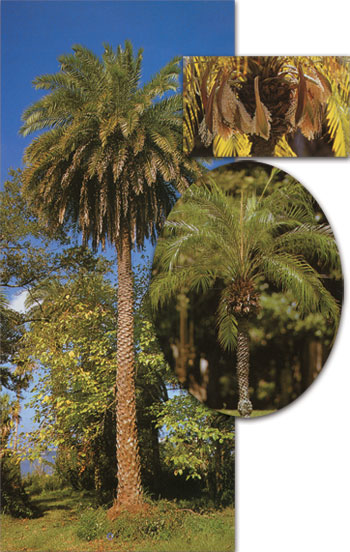
Allah's advice to Mary to eat dates could be an indication to their beneficial vitamins and minerals.
Not knowing who this man was, she sought refuge with Allah and told him that she held Allah in the utmost fear and respect: "She said: 'I seek refuge from you with the All-Merciful, [leave me] if you have fear [and respect] of Allah'" (Surah Maryam: 18). Her words clearly demonstrate her complete trust in Allah, as well as the importance she placed upon chastity and devotion to Allah. Her words not only expressed all of this, but also called upon this unknown man to have fear and respect of Allah.
Gabriel introduced himself with the following words: "I am only your Lord's messenger [an angel] so that He can give you a pure boy" (Surah Maryam: 19). As Allah recounts in the Qur'an:
When the angels said: "Mary, your Lord gives you good news of a Word from Him. His name is the Messiah, Jesus, son of Mary, of high esteem in this world and the Hereafter, and one of those brought near." (Surah Al 'Imran: 45)
Mary replied: "How can I have a boy when no man has touched me and I am not an unchaste woman?" (Surah Maryam: 20), thereby indicating her chastity. Gabriel told her that:
He [Gabriel] said: "It will be so." Allah creates whatever He wills. When He decides on something, He just says to it, "Be!" and it is. (Surah Al 'Imran: 47)
He said: "It will be so." Your Lord says: "That is easy for Me. It is so that We can make him a Sign for humanity and a mercy from Us. It is a matter already decreed." So she conceived him and withdrew with him to a distant place. (Surah Maryam: 21-22)
By Allah's will, Mary became pregnant with the Prophet Jesus (pbuh) and yet remained a virgin. Her pregnancy was independent of this world's usual cause-and-effect relationship. The circumstances of his conception were among the features of the Prophet Jesus' (pbuh) miracles.
O humanity Remember Allah's blessing to you.
Is there any creator other than Allah providing for you from heaven and earth? There is no deity but Him. So how have you been led astray?
(Surah Fatir, 3)
Allah reveals "So she conceived him and withdrew with him to a distant place" (Surah Maryam: 22). In this distant place to which she retreated, Allah supported her with His grace and protection and met all of her material and psychological needs during her pregnancy.
No doubt, Mary withdrew from her society for many reasons. For example, Allah removed her from her people's criticism, for they could not understand her miraculous situation. This also enabled her to spend this period in a state of contentment and peace. Later on, by another miracle, Allah revealed her miraculous circumstances, refuted all of the accusations and slanders directed toward her, and restored her impeccable reputation.
Allah fully supported Mary throughout her pregnancy. It is very difficult for a woman to give birth, a potentially life-threatening experience, all-alone, without medical equipment or a midwife's assistance. Nevertheless, Mary overcame all of these difficulties by placing her complete trust in Allah. Allah helped her with revelations while she was struggling toward a date tree in the full throes of labor pains. Allah told her not to grieve, that He had placed a stream at her feet, and that she should shake the date tree in order to get freshly ripe dates to eat. He also told her to drink and to delight her eyes. As a result, she gave birth in the best possible circumstances. Allah reveals her situation:
The pains of labor drove her to the trunk of a date-palm. She exclaimed: "Oh, if only I had died before this time and was something discarded and forgotten!" A voice called out to her from under her: "Do not grieve. Your Lord has placed a small stream at your feet. Shake the trunk of the palm toward you, and fresh, ripe dates will drop down to you. Eat and drink, and delight your eyes. If you should see anyone at all, just say: 'I have made a vow of abstinence to the All-Merciful, and [so] today I will not speak to any human being.'" (Surah Maryam: 23-26)
Allah's grace and protection was clearly visible in this situation. In fact, His advice to her has been confirmed by modern science. We now analyze this advice in some detail.

As stated earlier, Mary withdrew from her society so that she could be in a psychologically peaceful environment and away from the hurtful behavior of people who could not comprehend her miraculous situation.
Allah told her not to grieve and bestowed His grace and protection upon her. No doubt, there was much wisdom in this advice, just as there was in Mary's withdrawal to a distant place. Muslims must not surrender to sadness; rather, they are to trust in Allah and feel the peace of mind that comes with knowing that Allah will always help them.
This attitude, which is required of all believers, has been confirmed by modern medicine, for doctors tell women, both during their pregnancy and while they are giving birth, to maintain a positive attitude and avoid any sadness and stress. His advice to delight her eyes means not to surrender to sadness and to enjoy the news of Allah's gift.
Allah advised Mary to eat freshly ripened dates. Today, such dates are considered to be food and medicine. Scientists now know that dates contain more than ten substances considered essential for the human body's well-being and continuing health.
Dates contain plenty of the easily digested and absorbed sugars that give the human body its energy for heat and movement. More importantly, these sugars are of the fructose type and not of the glucose type, which quickly raises the blood-sugar levels. Dates provide energy, help muscle tissues and nerve cells develop, and are especially beneficial for people weakened by illness or those suffering from exhaustion, because of their high caloric value. For example, 100 grams of dates contain 1.5 grams of protein and 50 grams of carbohydrates. In addition, their caloric value is 225 kcal. Fresh dates have a 60-65 percent sugar content and a 2 percent protein content.
This information reveals some of the wisdom inherent in Allah's advice to Mary. Now, scientists inform us that date is an important source of nutrients because it contains all of the necessary essentials for human life.2 In fact, one renowned expert on the subject, V. H. W. Dowson, suggests that one glass of milk and one date per day provides a person's daily nutritional requirements.3
Dates contain various vitamins (e.g., A, beta-carotene, B1, B2, B3, and B6) and minerals, (e.g., sodium, potassium, calcium, magnesium, fiber, iron, sulphur, phosphorus, and chlorine) and are also rich in fiber, fats, and proteins. Some of the ensuing benefits are as follows:
Our Prophet (may Allah bless him and grant him peace) pointed out the benefits of dates in the following hadith: A family that has dates will not be hungry.8 This is a piece of very good advice.
All of our current information on dates reveals Allah's infinite wisdom and grace upon Mary, who, inspired by Allah, satisfied all of her nutritional needs by eating dates and thereby eased her child's birth. (Allah knows the truth.)
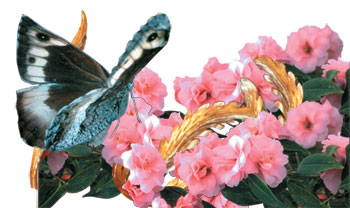
Another matter that should be reflected upon is the little stream created by Allah and His advice for Mary to eat and drink. Allah told Mary that He had placed a stream by her feet to eat, drink, and delight her eyes.
Water, like dates, eases labor pains and regulates muscle tension. In fact, some modern birth clinics have pools in which the delivery takes place.
Water, which is necessary for life and one's physical well-being, plays an important role in regulating the body's temperature, transporting nutritional elements and oxygen, and removing waste matter from the body's cells. It also ensures the healthy movement of joints, skin moisture and elasticity, the digestive system, and protects tissues and organs. Water is becoming more widely used in therapy by the day. Contact with water stimulates the immune system, increases anti-stress hormone production, reduces pain, and stimulates blood circulation and metabolism.9
Water is important during pregnancy for several reasons. At that time, water intake is especially necessary because the volume of blood increases and because of the developing baby's needs. Women who choose to breast-feed need plenty of water to produce the necessary amount of milk. Considering that 87 percent of this milk is water, we can see how important this production is.
Water also maintains the electrolyte balances in the blood of the mother and the child. Hormones released during pregnancy alter the way various body fluids are used. Toward the end of the woman's pregnancy, blood volume increases 150 percent, and the loss of water through breathing is much greater. The amnion fluid, in which the baby grows, is renewed every three hours. However, it can decrease, as in the case of dehydration caused by insufficient water intake.
Dehydration during pregnancy also can cause premature labor. Some hormones released in such situations imitate the hormones that trigger labor pains. Cases in which premature birth is a significant risk are treated by giving fluids through the veins, a procedure that highlights the importance of water intake. Such premature tensions are often cured by this fluid therapy.
Water also forms the human body's transport system. Via the bloodstream, it carries food and oxygen to the embryo and helps prevent some common infections that can cause miscarriage or premature labor and birth. Sufficient water intake reduces the risks of such infections.10 Doctors inform their patients that their water requirement increases by 50 percent during pregnancy. If the water intake is insufficient, the body reduces the quantity of some fluids, which, in turn, causes various complaints.11
Modern science shows once more the wisdom in Allah's creation of the stream for Mary and His advice to eat dates and drink water. All of this is evidence of Allah's infinite knowledge.
Allah tells Mary to shake the date tree toward her when she was headed toward it in her labor pains. (Surah Maryam: 25)
Doctors say that pulling something toward oneself during labor can have a positive effect on the muscles. In order to ease labor pains and help bring about a safe delivery, women are advised to do certain exercises that reduce pressure in the body and, therefore, the risk of complications during delivery. They are also thought to quicken the process of giving birth.12
Doctors suggest that in the second stage of labor, the woman's head should be slightly raised to take advantage of gravity. Thus, hospital delivery rooms have beds with suitably placed handles and footrests that enable pregnant women to give birth in the most comfortable position.
Other practitioners advise their patients to squat or sit on specially adapted birth chairs. Before recent technological developments, some birth rooms featured a rope hanging from the ceiling, which the expectant mother was to use to try and pull herself up, thus helping the birth process. All of these methods are theoretically and logically helpful.13 Perhaps this is why Allah told Mary to pull and shake the date tree. (Allah knows the truth.)
When Mary returned with the Prophet Jesus (pbuh), her people could not comprehend Allah's miracle. Thus, they slandered her, even though they knew that she, being a member of 'Imran's family, was devout, held Allah in great fear and respect, had an immaculate character, and always protected her modesty. Allah reveals some of these slanders:
She brought him to her people, carrying him. They exclaimed: "Mary! You have done an unthinkable thing! Sister of Aaron, your father was not an evil man nor was your mother an unchaste woman!" (Surah Maryam: 27-28)
No doubt, this was a trial for Mary, for she had to face such accusations despite being a chaste woman who held Allah in the greatest respect and awe. These people ignored her impeccable character and honorable conduct, despite her own reputation and that of her family, and so, as always, she turned toward Allah, and trusted in Him, knowing that He would defend her in the best possible way.

Allah, Who always answered her prayers with generosity and compassion, gave her inner peace during this trial. Knowing that Allah would exonerate her completely, Allah inspired her to make a vow: "If you should see anyone at all, just say: 'I have made a vow of abstinence to the All-Merciful, and today I will not speak to any human being'" (Surah Maryam: 26). This is what she told her people.
After this, she only pointed to the Prophet Jesus (pbuh), about whom Allah said through Gabriel: "He will speak to people in the cradle and when fully grown, and will be one of the believers" (Surah Al 'Imran: 46), when people confronted and slandered her.
Allah showed her people a great miracle by enabling the Prophet Jesus (pbuh) to speak while he was still a baby in the cradle. Through his words, Allah exonerated his mother Mary and also introduced the Prophet Jesus (pbuh) as one of His Prophets sent to the Israelites:
She pointed toward him. They asked: "How can a baby in the cradle speak?" He [Jesus] said: "I am the servant of Allah. He has given me the Book and made me a Prophet. He has made me blessed wherever I am, directed me to perform prayer and give alms [zakat] as long as I live, and to show devotion to my mother. He has not made me insolent or arrogant. Peace be upon me the day I was born and the day I die, and the day I am raised up again alive." That is Jesus, son of Mary, the Word of Truth about which they are in doubt. (Surah Maryam: 29-34)
This miracle amazed Mary's people. By saying: "… and she who guarded her chastity. We breathed into her some of Our Spirit and made her and her son a Sign for all the worlds" (Surat al-Anbiya': 91), Allah made both of them superior to all other people. Mary's superior character, honor, and purity were revealed through this speech, and those who had slandered her were defeated.
By saying: "And We made the son of Mary and his mother a Sign and gave them shelter on a mountainside where there was a meadow and a flowing spring" (Surat al-Mu'minun: 50), He reveals that the Prophet Jesus (pbuh) and Mary continued to live under His grace after these events.
These miracles showed the Israelites that Allah had made Mary and the Prophet Jesus (pbuh) superior to other people. In fact, Allah reveals that those who continued to slander Mary would be punished severely:
And [We punished them] on account of their unbelief, their utterance of a monstrous slander against Mary, and their saying: "We killed the Messiah, Jesus, son of Mary, Messenger of Allah." … (Surat an-Nisa': 156-157)
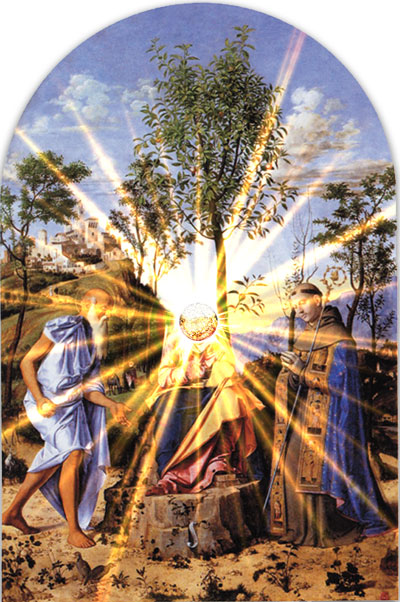
Cima da Conegliano's painting, 1509-10. It is on display in the Church of the Carmini, Venice, Italy.
Mary is a role model for all Muslim women because she maintained her impeccable character throughout her life. Allah raised her like a lovely plant, to use the Qur'an's expression, and gave her a very important responsibility. Allah chose her, just as He chose 'Imran's family, made her one person in this lineage of the most devout and faithful people, and had her raised by these virtuous people.
He then gave her the character of a chosen and superior Prophet by entrusting her education to the Prophet Zacharia (pbuh). When she reached this level of maturity, Allah began to show her His miracles, and she clearly saw His grace, protection, and mercy upon herself. One example of this support and grace was that she found food on the altar whenever she worshipped Him. Later on, Allah introduced her to Gabriel, who told her about Allah's grace on her with his own words.
Mary demonstrated her genuine devotion and loyalty to Allah through her impeccable virtue and behavior. She also expressed her profound and genuine devotion to Him through her determination, devotion, and unconditional surrender to His will.
Being alone in moments of great difficulty was a great trial for her, because she had no one to help, support, or guide her. Usually, lonely people surrender to helplessness and sadness. But Mary did not, for she placed all of her hope and trust only in Allah.
She constantly sought His help and knew that she only needed to obey Him and follow His guidance. She never gave in to hopelessness and depression, no matter how difficult the trial, because she had surrendered wholeheartedly to Allah in the knowledge that He would turn all adversities into good and end the hardship in the best manner. And with every difficulty, Allah gave her a solution, supported her with His grace and help, and turned all hardships into goodness and beauty.
Her inexperience was also an important aspect of her trial. She became pregnant and delivered her child all alone. Totally alone and ignorant of what to do, she resisted pessimism and displayed her great strength, willpower, and determination. In addition, she had the peace of mind characteristic of those who know that Allah supports them with the most perfect gifts. Thus He eased her burden and helped her to succeed.
Another sign of Mary's superior character was the patience she showed while fulfilling her difficult responsibilities. Her unbelieving people tried her patience by failing to grasp her superior and honorable position, viewing her according to their own misguided knowledge, and accusing her of things that she had not done. Here, too, she showed her patience and complete faith in Allah. She did not compromise her strength, willpower, and integrity, knowing full well that Allah controls everything and thus would exonerate her.
Another noticeable character trait was her total lack of interest in winning her people's acceptance. She had surrendered to Allah with a pure faith, and was therefore unaffected by their accusations and comments. Given her faith and devotion, all she strove to do was to behave in the way that would earn Allah's good pleasure. As a result, Allah rewarded her with His grace.
There are two ways of conveying one's good character to others: through words and through moral behavior. The second way is far more effective and valuable, for it is the genuine way and cannot be imitated. One's life and behavior can reflect one's belief only if it is genuinely alive in one's heart.
Mary displayed this superior morality and became a role model and a living invitation to religion through her faith, behavior, and character. Her genuine call is answered in the best possible way, Allah willing. The believers' faith continues to deepen as they follow Mary's example and try to emulate her character.
1. Mahmud Alusi, Ruh al-Maani fi Tafsir al-Qur'an (Beirut), 3:133-34; Ismail Hakkı Bursevi, Ruhu'l Beyan (Spritiual Meaning) (Istanbul: 1306 ah) 1:321.![]()
2. http://www.geocities.com/SoHo/Easel/3809/hurma.htm![]()
3. "Date and Health;" www.sgp-dates.com/date.htm![]()
5. "Date Palm," Telmedpak Agriculture; www.telmedpak.com/agricultures.asp?a=agriculture&b=date_palm![]()
7. "Break Your Fasting On Dates," Islamonline.net; http://198.65.147.194/English/Science/2000/7/article5. shtml; "Mothering and Oxytocin or Hormonal Cocktails for Two," Sarah Blaffer Hrdy and C. Sue Carter ; www.people.virginia.edu/~rjh9u/oxytocin.html![]()
9. www.yasamsaglik.com/HaberAraSonuc. asp?txtAnahtar1=Migren; http://www.autismtr. org/hydroteraphy.htm![]()
10. "Preganancy and Water;" www.mumcu.com/html/article.php?sid=247![]()
11. www.bebek.com/index.asp?bolum=12&haberid=173![]()
12. http://www.bebek.com/index.asp?bolum=4&konu=49![]()
13. "The second stage of pregnancy;" www.mumcu.com/html/article.php?sid=43![]()